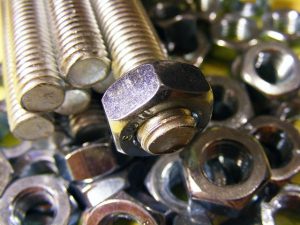
When you think of fasteners, what’s the first thing that comes to mind? It’s a probably a screw. Featuring helical ridges, they’ve become synonymous with fasteners. The exterior threading allows screws to dig into workpieces and objects, essentially scooping out material to create a secure hold. Not all screws are the same, however. Machine screws, for instance, feature a unique design that distinguishes them from other common types of screws. To learn more about machine screws and how they work, keep reading.
The Basics of Machine Screws
A machine screw is a type of fastener that, like, other fasteners, is used to join two or more objects. Machine screws are unique, though, because of their size. The American Society of Mechanical Engineers (ASME) defines machine screws as featuring a diameter of up to 0.75 inches. They can be smaller than 0.75 inches in diameter, but they can’t be larger than this size. As a result, machine screws are generally smaller than most other types of screws.
In addition to a diameter of 0.75 inches or less, machine screws are characterized by uniform threading. What does this mean exactly? Well, screws typically feature either uniform or tapered threading. Uniform threading means the exterior threading — the helical ridges on the outside of the screw — remain the same size from the top of the screw to the bottom. In comparison, tapered threading means the screw’s threading expand taper or expand towards the bottom. Machine screws feature uniform threading that remains the same size from the top to the bottom.
Advantages of Machine Screws
Machine screws are often preferred over other, larger screws. Because of their small size, they offer a wider range of applications. Machine screws can be used to join countless types of products, objects and surfaces.
Machine screws are also available in material different materials. Stainless steel is a popular material used in the construction of machine screws. It’s strong, durable and offers a high level of protection against rust and corrosion. Aluminum is another common material used in the construction of machine screws. Like stainless steel, it offers protection against rust and corrosion. Aluminum machine screws aren’t as strong as their stainless steel counterparts, but they don’t weigh as much, either. For applications where weight is a concern, aluminum machine screws may be preferred.
Many people assume that machine screws are used to join metal objects, such as machines, together. While this makes sense considering their name, the term “machine screw” actually refers to relatively small screws with a diameter of 0.75 inches or less.
If you are looking to purchase Machine Screws, look at Monroe Engineering to help you.
No tags for this post.